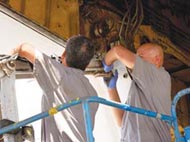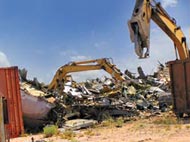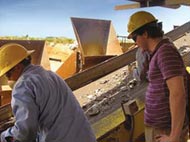
The evolution of AFRA
In 2006, Boeing and 10 other aerospace companies formed AFRA with a common commitment to improve the way older airplanes are managed. This international cooperative effort was facilitated by Boeing to leverage the experience of the founding members to develop and implement environmentally progressive recycling procedures. AFRA now has 34 members throughout the world, including France, Ireland, the Netherlands, South Africa, Switzerland, Turkey, the United Kingdom, and the United States. It is funded exclusively by its members and by revenue from its audit and accreditation program. AFRA membership is open to any company with a primary business focus on the world’s aging fleet, and to university groups and technology companies that are developing improved airplane recycling processes.
AFRA’s objectives include addressing the environmental concerns of retired airplanes and creating and sharing upgraded processes. AFRA provides owners of aging airplanes with audits of a company’s performance relative to AFRA’s “Best Management Practice” document to ensure that the company has the expertise and process fidelity to part-out and dismantle an airplane in a safe, environmentally progressive, economically beneficial manner that will maximize value and minimize risk to the owner.
These goals mesh with Boeing’s objectives for airplane recycling, providing methods for safe parts recovery and environmentally responsible scrapping and recycling for airplanes that are not suitable for continued service (see fig. 1). The key is to greatly improve materials recovery from retired airplanes (and manufacturing scrap) and return that material to high-end manufacturing applications.
FOCUS OF BOEING AIRPLANE RECYCLING
Figure 1
Facilitate the development and implementation of more efficient recycling processes that:

IMPROVING THE PROCESS OF RETIRING AIRPLANES
AFRA is dedicated to the concept that end-of-service is not end-of-life. Its mission is to help airlines achieve the best return for their retired airplanes while promoting responsible recycling and developing safe and sustainable solutions for the reuse of airplane parts and assemblies from older airplanes.
The AFRA network provides complete and clear guidance for airplane owners to use when selecting a company to manage their end-of-service equipment — now and in the future. The association’s members share a commitment to improving older fleet asset management and fostering the recovery and the safe and environmentally progressive reuse of aerospace materials (see fig. 2).
SAFE AND SUSTAINABLE SOLUTIONS
Figure 2
AFRA advocates an airplane recycling process that emphasizes safe and economical return of airplanes, engines, and parts to revenue service (left), safe scrapping of airplanes (center), and maximizing the value of reclaimed materials (right).

[+] Enlarge

[+] Enlarge

[+] Enlarge
Specifically, the group is dedicated to:
- Safe and environmentally responsible management of the world’s aging and retired airplane fleet.
- Safe and economical return of airplanes, engines, and parts to revenue service.
- Safe return of engines and parts to the world fleet.
- Safe return of reclaimed materials (including composites, aluminum, and electronics) back into commercial manufacturing at maximum value.
- Safe scrapping of airplanes at dedicated sites with appropriate procedures, including parting out and decontamination (i.e., safely removing and managing the fluids that remain after an airplane has been parked for the last time).
Since AFRA’s inception, member organizations have remarketed (i.e., returned to service) approximately 2,000 airplanes and scrapped more than 6,000 commercial airplanes and 1,000 military aircraft (including 800 tactical aircraft). AFRA members are currently processing 150 airplanes, containing 1,000 tons of airplane specialty alloys and 25,000 tons of airplane aluminum annually.
“BEST MANAGEMENT PRACTICE” PROVIDES EMPHASIS FOR RECYCLING
AFRA has published a document entitled “Best Management Practice for Management of Used Aircraft Parts and Assemblies” and has implemented an audit program that accredits companies that follow the minimum standards outlined in the document. The document and accreditation program outline specific guidelines to enhance the effective and responsible recycling of airplanes and provide a neutral third-party assessment of scrapping companies.
For example, to become accredited by AFRA, airplane recycling facilities must have several key components built into their operational model, including:
- Adequate systems, resources, and documentation to safely disassemble an airplane in an environmentally responsible manner:
- Adequate containment for accidental spills.
- Adequate space so that, if the facility handles more than one airplane at a time, each airplane can be disassembled so there is no mixing of parts among projects.
- Designated areas to quarantine parts that are removed from an airplane before they can be inspected and properly tagged.
- Designated areas that have adequate static discharge protection for parts that need that type of storage.
- A sufficiently robust documentation and tagging system to track parts from the time they leave the airplane until they reach a used parts distributorship.
- Personnel to perform the disassembly who have been trained in the disassembly information from the manufacturer’s technical manuals and who have access to the model-specific manuals and properly calibrated and maintained manufacturer-specified tools.
- Internal systems and an adequate internal audit program to ensure that removed parts are properly inventoried and stored and that relevant regulations are followed for the jurisdiction where the facility is located.
- Adequate procedures and safeguards to ensure that the asset is disassembled in an environmentally responsible manner and that materials recovered during the scrapping operation are recycled in accordance with the asset owner’s wishes.
- AFRA has accredited five companies through July 2008: Air Salvage International (United Kingdom), Europe Aviation (France), P3 Aviation (United Kingdom), Southern California Aviation (United States), and Volvo Aero (United States).

